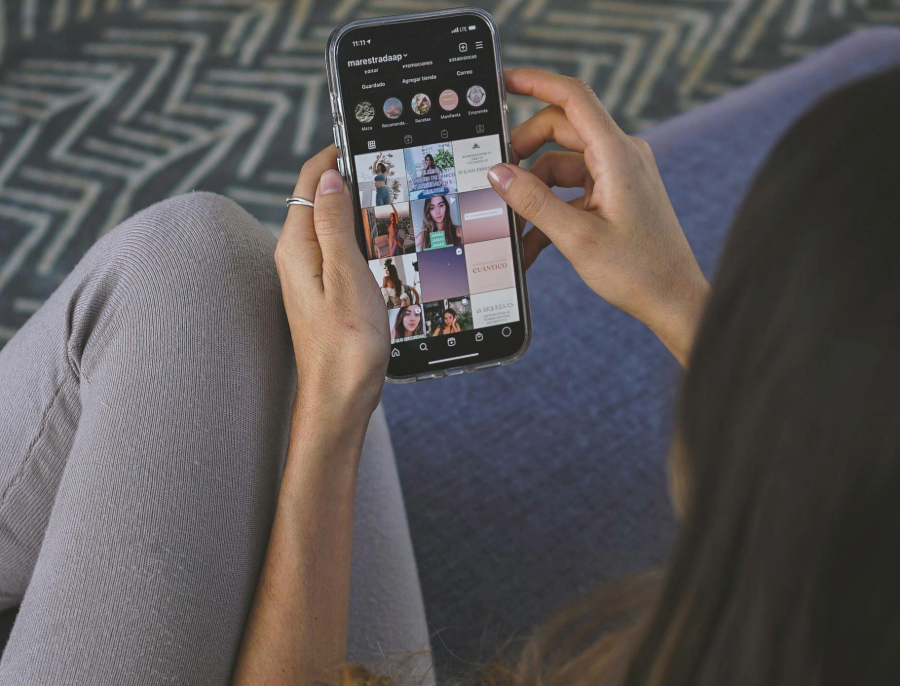Is Scrolling a Natural Instinct? Here’s How to Be Mindful and Present in an Overconnected World

Have you been feeling spread too thin, overwhelmed, or mentally exhausted? Join the club. In our 24/7, on-demand, hustle culture, it’s no surprise that you are running on fumes. In the age of the internet, social media, and AI, we are more connected than ever, and too much of a good thing can be bad. The latest headlines, the after-hours work emails, the social media feeds—it’s all at our fingertips. So why do we carry so much stress and feel more lonely than ever?
Toxic resilience and hustle culture might just be the culprits fueling our exhaustion. On a recent episode of Real Pod, host Victoria Garrick Browne spoke with Harvard physician and stress expert Dr. Aditi Nerurkar about burnout, bandwidth, and why everyone seems so mentally exhausted. Dr. Nerurkar, author of The 5 Resets anda regular on The Today Show, also shares why multitasking might not be as beneficial as you think. Here’s how to reset your brain and body for less stress and more peace.
Why is everyone feeling so stressed
Not all stress is created equally. Dr. Nerurkar explains that there are two types of stress: maladaptive stress (bad, unhealthy stress that gets in the way of your ability to function like insomnia, anxiety, and depression) and adaptive stress (good, manageable stress that moves your life forward).
If you are struggling with “bad stress” and feeling overwhelmed, you are not alone. Statistics say that 70 percent of people are dealing with burnout and stress. There are also unprecedented rates of burnout. It’s a universal predicament.
So why is everyone so stressed? Dr. Nerurkar notes that there are numerous factors, but one of the most significant is the COVID-19 pandemic. Yes, the headlines say it’s over and it’s time to move on, but Dr. Nerurkar explains that the mental health manifestations of the pandemic are ongoing. “All of those pent-up emotions of keeping it together through lockdown, washing groceries, panic buying toilet paper and Purell, when you come out of the experience, the dam breaks. True emotions emerge,” she explains.
It’s important to understand how the brain works. “During periods of acute stress, you keep it together. Once that stress passes, it all comes to the surface,” Dr. Nerurkar explains. “If you feel worse now than you did in 2020, you’re not alone. In science, it is referred to as delayed stress. The only way out is through, and once you make it through, you get back your excitement and energy.”
Equating worth with hard work
If you are juggling impossible standards but still feel like you’re not achieving enough, your idea of resilience might be skewed. Resilience, according to Dr. Nerurkar, is your innate ability to adapt, recover, and grow in the face of life’s challenges. Toxic resilience, on the other hand, is a distinct concept. “We all have toxic resilience. It’s been instilled in us since we were little kids,” Dr. Nerurkar explains. “It’s when you tolerate large amounts of discomfort. But this is not the true definition of resilience.”
True resilience honors your human limitations, understands your need for rest and recovery (it’s not a luxury), and leans into self-compassion. Toxic resilience is a mind-over-matter mindset; it’s productivity at all costs.
Creating digital boundaries
In our social media culture, a good life is often defined by being on-the-go all the time, trying to achieve, and reach every impossible standard. Dr. Nerurkar explains that this is called hedonic happiness—a hamster wheel type of happiness defined by achieving, consumption, and meeting certain self-prescribed metrics.
“Humans are meant for a sense of meaning, purpose, connection, and something bigger than us. Humans are meaning-seeking creatures,” she explains. “Your brain and body need a rest; you need sleep and to unplug.”
Sixty percent of people experiencing burnout struggle with the inability to disconnect or disengage from work, their devices, and deadlines. When you are constantly scrolling on your phone, it can lead to a phenomenon Dr. Nerurkar describes as “popcorn brain,” where your brain feels like it is overstimulated, causing it to feel like it is popping. Popcorn brain makes life offline feel slow and boring.
You can remain mindful and intentional while still being ambitious and achieving your goals. It starts with setting healthy digital boundaries. Dr. Nerurkar suggests staying off your device at night, putting your phone in another room when you sleep, or being present and avoiding phone use while with family and friends.
Brain resetting tools
Dr. Nerurkar doesn’t want you to renounce technology. Instead, she encourages you to decrease your reliance on technology. That’s a relief—you don’t have to become a digital monk. “Technology is a beautiful thing. We are connected because of technology,” she says. “Technology is important to educate, inform, connect, and inspire us, but there has to be healthy boundaries.”
Here are the tools Dr. Nerurkar suggests to reclaim groundedness and presence in your life:
- Go to bed at 10 p.m. each night, calling it the “golden hour” for sleep.
- Incorporate daily movement into your routine. Even walking five minutes a day can rewire your brain.
- Practice gratitude. Write down five things you are grateful for every day. It leads to a better mood and reduces anxiety.
- Lean into your community. Connection is therapeutic.
- Lastly, Dr. Nerurkar encourages a great deal of self-compassion. “When you are more kind and gentle with yourself, you dial down the volume of your stress,” she says. “Change is possible and within your reach.”
Read This
- Dr. Tiffany Moon on When High Achievement Leads to Burnout
- Stop Waiting for the Other Shoe to Drop and Learn How to Accept Good Things
- 5 Tips For Reversing Your 2025 Burnout




















Leave a Reply